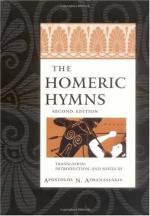Then Hermes answered him with cunning words:
“Shrewdly thou questionest me, Far-darter, nor do I grudge thee to enter upon mine art. This day shalt thou know it: and to thee would I fain be kind in word and will: but within thyself thou well knowest all things, for first among the Immortals, Son of Zeus, is thy place. Mighty art thou and strong, and Zeus of wise counsels loves thee well with reverence due, and hath given thee honour and goodly gifts. Nay, they tell that thou knowest soothsaying, Far-darter, by the voice of Zeus: for from Zeus are all oracles, wherein I myself now know thee to be all-wise. Thy province it is to know what so thou wilt. Since, then, thy heart bids thee play the lyre, harp thou and sing, and let joys be thy care, taking this gift from me; and to me, friend, gain glory. Sweetly sing with my shrill comrade in thy hands, that knoweth speech good and fair and in order due. Freely do thou bear it hereafter into the glad feast, and the winsome dance, and the glorious revel, a joy by night and day. Whatsoever skilled hand shall inquire of it artfully and wisely, surely its voice shall teach him all things joyous, being easily played by gentle practice, fleeing dull toil. But if an unskilled hand first impetuously inquires of it, vain and discordant shall the false notes sound. But thine it is of nature to know what things thou wilt: so to thee will I give this lyre, thou glorious son of Zeus. But we for our part will let graze thy cattle of the field on the pastures of hill and plain, thou Far-darter. So shall the kine, consorting with the bulls, bring forth calves male and female, great store, and no need there is that thou, wise as thou art, should be vehement in anger.”
So spake he, and held forth the lyre that Phoebus Apollo took, and pledged his shining whip in the hands of Hermes, and set him over the herds. Gladly the son of Maia received it; while the glorious son of Leto, Apollo, the Prince, the Far-darter, held the lyre in his left hand, and tuned it orderly with the plectrum. Sweetly it sounded to his hand, and fair thereto was the song of the God. Thence anon the twain turned the kine to the rich meadow, but themselves, the glorious children of Zeus, hastened back to snow-clad Olympus, rejoicing in the lyre: ay, and Zeus, the counsellor, was glad of it. [Both did he make one in love, and Hermes loved Leto’s son constantly, even as now, since when in knowledge of his love he pledged to the Far-darter the winsome lyre, who held it on his arm and played thereon.] But Hermes withal invented the skill of a new art, the far-heard music of the reed pipes.
Then spake the son of Leto to Hermes thus:
“I fear me, Son of Maia, thou leader, thou crafty one, lest thou steal from me both my lyre and my bent bow. For this meed thou hast from Zeus, to establish the ways of barter among men on the fruitful earth. Wherefore would that thou shouldst endure to swear me the great oath of the Gods, with a nod of the head or by the showering waters of Styx, that thy doings shall ever to my heart be kind and dear.”




